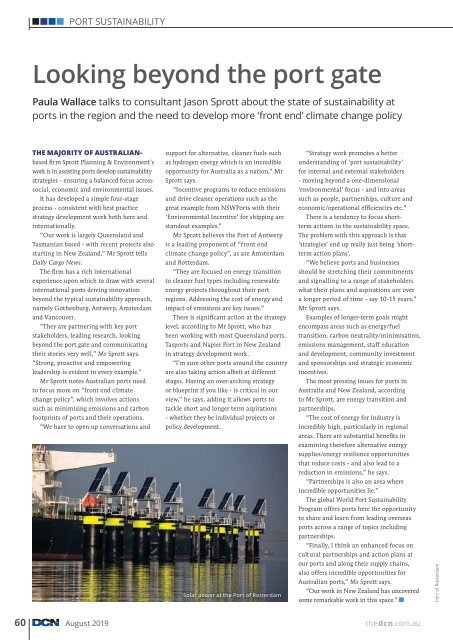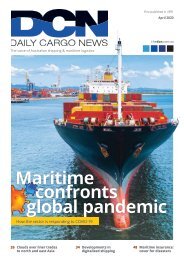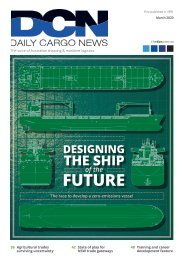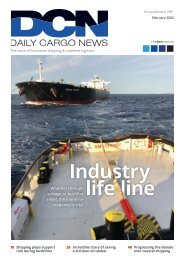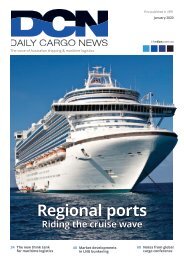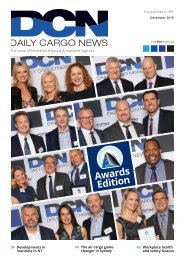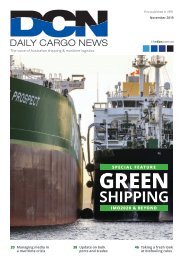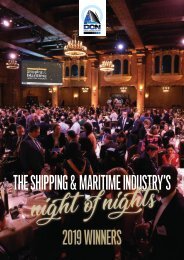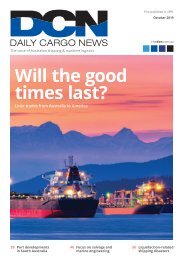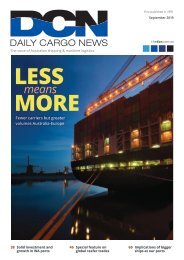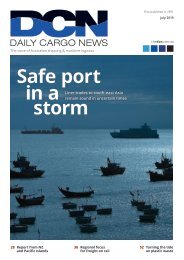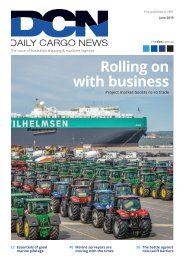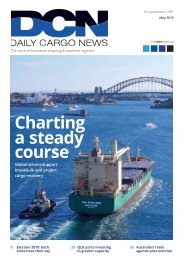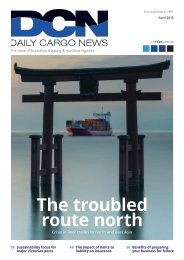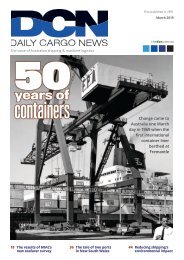DCN AUGUST Edition 2019
Create successful ePaper yourself
Turn your PDF publications into a flip-book with our unique Google optimized e-Paper software.
PORT SUSTAINABILITY<br />
Looking beyond the port gate<br />
Paula Wallace talks to consultant Jason Sprott about the state of sustainability at<br />
ports in the region and the need to develop more ‘front end’ climate change policy<br />
THE MAJORITY OF AUSTRALIANbased<br />
firm Sprott Planning & Environment’s<br />
work is in assisting ports develop sustainability<br />
strategies - ensuring a balanced focus across<br />
social, economic and environmental issues.<br />
It has developed a simple four-stage<br />
process - consistent with best practice<br />
strategy development work both here and<br />
internationally.<br />
“Our work is largely Queensland and<br />
Tasmanian based - with recent projects also<br />
starting in New Zealand,” Mr Sprott tells<br />
Daily Cargo News.<br />
The firm has a rich international<br />
experience upon which to draw with several<br />
international ports driving innovation<br />
beyond the typical sustainability approach,<br />
namely Gothenburg, Antwerp, Amsterdam<br />
and Vancouver.<br />
“They are partnering with key port<br />
stakeholders, leading research, looking<br />
beyond the port gate and communicating<br />
their stories very well,” Mr Sprott says.<br />
“Strong, proactive and empowering<br />
leadership is evident in every example.”<br />
Mr Sprott notes Australian ports need<br />
to focus more on “front end climate<br />
change policy”, which involves actions<br />
such as minimising emissions and carbon<br />
footprints of ports and their operations.<br />
“We have to open up conversations and<br />
support for alternative, cleaner fuels such<br />
as hydrogen energy which is an incredible<br />
opportunity for Australia as a nation,” Mr<br />
Sprott says.<br />
“Incentive programs to reduce emissions<br />
and drive cleaner operations such as the<br />
great example from NSWPorts with their<br />
‘Environmental Incentive’ for shipping are<br />
standout examples.”<br />
Mr Sprott believes the Port of Antwerp<br />
is a leading proponent of “front end<br />
climate change policy”, as are Amsterdam<br />
and Rotterdam.<br />
“They are focused on energy transition<br />
to cleaner fuel types including renewable<br />
energy projects throughout their port<br />
regions. Addressing the cost of energy and<br />
impact of emissions are key issues.”<br />
There is significant action at the strategy<br />
level, according to Mr Sprott, who has<br />
been working with most Queensland ports,<br />
Tasports and Napier Port in New Zealand<br />
in strategy development work.<br />
“I’m sure other ports around the country<br />
are also taking action albeit at different<br />
stages. Having an over-arching strategy<br />
or blueprint if you like - is critical in our<br />
view,” he says, adding it allows ports to<br />
tackle short and longer term aspirations<br />
- whether they be individual projects or<br />
policy development.<br />
Solar power at the Port of Rotterdam<br />
“Strategy work promotes a better<br />
understanding of ‘port sustainability’<br />
for internal and external stakeholders<br />
- moving beyond a one-dimensional<br />
‘environmental’ focus - and into areas<br />
such as people, partnerships, culture and<br />
economic/operational efficiencies etc.”<br />
There is a tendency to focus shortterm<br />
actions in the sustainability space.<br />
The problem with this approach is that<br />
‘strategies’ end up really just being ‘shortterm<br />
action plans’.<br />
“We believe ports and businesses<br />
should be stretching their commitments<br />
and signalling to a range of stakeholders<br />
what their plans and aspirations are over<br />
a longer period of time - say 10-15 years,”<br />
Mr Sprott says.<br />
Examples of longer-term goals might<br />
encompass areas such as energy/fuel<br />
transition, carbon neutrality/minimisation,<br />
emissions management, staff education<br />
and development, community investment<br />
and sponsorships and strategic economic<br />
incentives.<br />
The most pressing issues for ports in<br />
Australia and New Zealand, according<br />
to Mr Sprott, are energy transition and<br />
partnerships.<br />
“The cost of energy for industry is<br />
incredibly high, particularly in regional<br />
areas. There are substantial benefits in<br />
examining therefore alternative energy<br />
supplies/energy resilience opportunities<br />
that reduce costs - and also lead to a<br />
reduction in emissions,” he says.<br />
“Partnerships is also an area where<br />
incredible opportunities lie.”<br />
The global World Port Sustainability<br />
Program offers ports here the opportunity<br />
to share and learn from leading overseas<br />
ports across a range of topics including<br />
partnerships.<br />
“Finally, I think an enhanced focus on<br />
cultural partnerships and action plans at<br />
our ports and along their supply chains,<br />
also offers incredible opportunities for<br />
Australian ports,” Mr Sprott says.<br />
“Our work in New Zealand has uncovered<br />
some remarkable work in this space.”<br />
Port of Rotterdam<br />
60 August <strong>2019</strong><br />
thedcn.com.au


